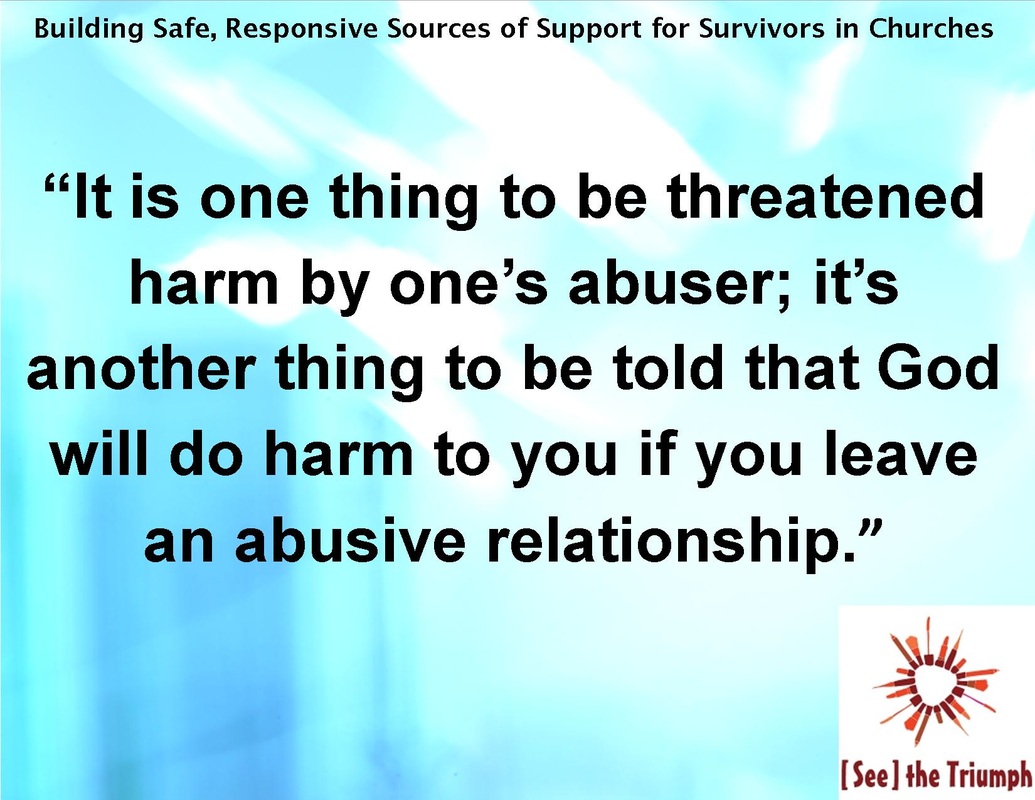|
3/11/2014 The Stigma of Intimate Partner Violence in Churches: Part Three - How Religion Can Perpetuate AbuseBy Christine Murray, See the Triumph Co-Founder
Today, we’re continuing to explore the potential ways that survivors of intimate partner violence may experience stigma within their faith communities. Our topic today is a sensitive one, in that it touches on some potentially very personal belief systems that people may hold. So, I want to begin by making clear that our goal is to share some of the experiences of some participants in our research through which they felt that their religious communities or beliefs added to the stigma they encountered in relation to their abuse. I’ll share that I am a Christian, and my own faith is a very central part of my own life. I don’t believe that religion inherently perpetuates abuse. However, I do believe that, sometimes, religious beliefs, practices, and organizational policies can add to the stigma surrounding abuse and increase the risk of further abuse. When participants in our research indicated that they felt that they experienced stigma from their religious communities, we asked them to describe what happened. Here are some of the examples: One participant said, “A lot of clergy and lay people [were] heavily leaning on me to stay with him because ‘God hates divorce,’ and my daughter would be ‘illegitimate’ if I divorced (and, of course, I'd be on the fast track to hell).” Another participant was told, “God hates divorce,” and encouraged to stay in the abusive relationship. Another participant shared that her church told her that domestic violence was not sufficient grounds for leaving an abusive marriage: “Later, when I filed for an annulment and it was denied by this same church in this country, I was told ‘If DV were grounds for annulment, everyone would be divorced!’” Some participants were threatened by members of their faith communities that God would harm them if they left their abusers, as shown in the following quotes:
Yet another participant sought--but never received--validation from her faith community about the level of abuse she experienced. She said, “I was married in the Catholic church and have since divorced. I filed paperwork for an annulment and was denied, even though I know I had multiple grounds, DV being only one of them. Having to justify my decision to leave my abuser, even years after the fact, to a bunch of priest(s) who don't know me and in a Church that didn't support me... I just don't see it as healthy, for me to keep trying to get some sort of validation from the Church that what I did was right, because I don't need them to tell me that. I already know.” Perhaps the most extreme statement we heard was that one participant heard the following message after disclosing abuse: “I was told to be glad to die and be a martyr for Jesus.” As I reflect upon the central role that faith plays in my own life, I can’t help but think about how powerful an impact these messages can have, as well as the internal turmoil they can create for survivors trying to decide what is the “right” way to respond to the violence they are experiencing. It is one thing to be threatened harm by one’s abuser; it’s another thing to be told that God will do harm to you if you leave an abusive relationship. Some of the views and experiences of the survivors we heard from were extreme and may not have represented the beliefs of all members of their faith communities. I believe it’s important to understand how these messages can impact survivors, especially as they grapple with how their faith intersects with their experiences of abuse and later recovery. This is our last of three posts in our series on how survivors of intimate partner violence may experience stigma in churches. Our next posts on this topic will look at ways that churches and faith communities can take action to promote safe and healthy relationships, as well as support survivors. We’d love to hear your ideas on this stigma: What else do you think perpetuates stigma surrounding abuse in faith communities? Comments are closed.
|
Archives
July 2024
CategoriesAll About Intimate Partner Violence About Intimate Partner Violence Advocacy Ambassadors Children Churches College Campuses Cultural Issues Domestic Violence Awareness Month Financial Recovery How To Help A Friend Human Rights Human-rights Immigrants International Media Overcoming Past Abuse Overcoming-past-abuse Parenting Prevention Resources For Survivors Safe Relationships Following Abuse Schools Selfcare Self-care Sexual Assault Sexuality Social Justice Social-justice Stigma Supporting Survivors Survivor Quotes Survivor-quotes Survivor Stories Teen Dating Violence Trafficking Transformative-approaches |
Search by typing & pressing enter



 RSS Feed
RSS Feed